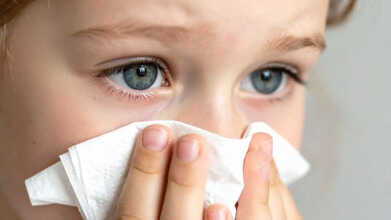- Health Conditions A-Z
- Health & Wellness
- Nutrition
- Fitness
- Health News
- Ayurveda
- Videos
- Medicine A-Z
- Parenting
Weekly Health Horoscope November 25- December 1, 2024: Eat Light And Nutrient-Dense Foods, Zodiacs

Weekly health horoscope
Aries
Aries is invited this week to welcome a balance between their physical and spiritual wellness. Recent emotional events could have left you looking for clarity; meditation is a great way to ground you. Set aside time for mild yoga and mindfulness exercises to help reduce mental tension and boost physical health. To restore your energy reserves—which could seem somewhat depleted from great mental activity—stay hydrated and eat complete meals.
Taurus
Taurus, this week your strength is your regular commitment to a rigorous schedule. Your own energy and passion will inspire you to investigate new physical pursuits, maybe a dance class or an outdoor trail. Still, keep in mind to pay attention to your body and avoid overdoing it. As your vitality depends on following your food plans, be sure you are doing so. Including restful activities like meditation or stretching will balance your active way of life.
Gemini
Gemini, this week pay special attention to consistency and moderation in your health habits. Fast food should not be your indulgence since your digestive system can be very delicate. Cut back on screen time to avoid eye strain; substitute outdoor activities that revitalize body and mind. Pay special attention to water and incorporate little, relaxing rituals like deep breathing exercises to improve mental clarity and focus.
Cancer
Cancer, the diligence you have placed into your exercise objectives is beginning to show. Though your physical condition should improve, keep sight of the discipline that led you here. To prevent burnout, strike a mix between rigorous exercise and relaxing times. To maintain both physical and emotional balance this week, give nutrient-dense foods top priority as well as self-care activities include warm baths or massages.
Leo
Leo, your increasing capacity to properly control stress and fury helps to improve both your mental and emotional state this week. Your physical condition will improve from this better balance. Keep up your consistent workout schedule and investigate mindfulness techniques as tai chi to strengthen your emotional foundation. Eat light and nutrient-dense foods to balance your vivid energy.
Virgo
Virgo, a flash of vitality and hope will drive your health objectives this week. Try new pursuits using this momentum, including starting a detox program or membership in a fitness club. Walking in a calm environment in the evening will enable you to balance your busy days with quiet evenings. Emphasize on developing a sustainable schedule fit for your long-term goals about wellness.
Libra
Libra, little but important changes in your health will make you happy this week. Steer clear of too demanding activities; instead, concentrate on low-impact yoga or pilates. Spending time at home will be especially revitalizing since it offers a secure environment to grow your body and mind. To maintain this phase of consistent progress, choose home-cooked, well balanced meals.
Scorpio
Scorpio, this week you will be motivated to advance your exercise path. Whether your goal is to investigate a calorie-conscious diet or commit to a new exercise, your will will produce transforming outcomes. Little, regular actions will have a big difference. To stay inspired, document your success, think about using a notebook or fitness app.
Sagittarius
Sagittarius, as you see improvements in chronic health problems, your optimism will be most helpful. This time of rebirth should be used to investigate holistic approaches including herbal treatments or acupuncture. Dancing or yoga are among the activities that combine body and mind and will improve your well-being. Maintaining this good trajectory depends on your food and water intake being constant.
Capricorn
This week should be focused on capricorn, agility and adaptability. To improve your physical endurance, including yoga or pilates into your regimen. Short breaks during work will guarantee constant energy across the day and help avoid tiredness. Review your diet to include more nutrient-dense foods; think about cutting coffee for improved recovery and sleep.
Aquarius
Aquarius, your health needs close attention to balance this week. Though exercise is important, too much of it can cause tiredness. Make sure you're sleeping enough and including restful exercises like tai chi or meditation into your schedule. Steer clear of processed, hefty meals; instead, concentrate on light, nouraging foods to support your active but delicate system.
Pisces
Pisces, lethargy may linger this week; so, rest and relaxation should be given top priority. Start your mornings gently, perhaps with stretching or sipping herbal tea. If your caring obligations cause you stress, think about getting outside help to prevent overloading yourself. Including foods high in vitamins and minerals will assist fight tiredness and raise your general vitality level.
Adenovirus: Is The Mystery Illness That’s Spreading Highly Contagious?

Credits: Canva
A little-known virus is spreading steadily across different parts of the world, prompting growing concern among health experts. Often described as “untreatable” because there is no targeted antiviral medicine available, adenovirus is drawing attention due to how tough it is and how quickly it can pass from person to person.
Eric Sachinwalla, medical director of infection prevention and control at Jefferson Health, has cautioned that while most healthy individuals develop only mild illness, people in high-risk groups may face more serious health problems. This raises an important question: just how contagious is this mystery illness that is spreading?
Adenovirus: How Contagious Is It?
Yes, adenovirus is highly contagious and spreads with ease in several ways. It can pass through respiratory droplets released during coughing or sneezing, close physical contact such as hugging or shaking hands, and contact with contaminated surfaces like toys and towels.
It can also spread through fecal matter, particularly during diaper changes, and in some cases through water. According to the CDC, the virus spreads quickly in crowded settings such as schools and daycare centres and can survive for long periods on surfaces, making good hygiene especially important for young children and people with weakened immune systems.
Who Do Adenoviruses Affect Most?
Adenoviruses can infect people of all age groups, but they are most commonly seen in children under the age of five. In babies and young children, the virus often spreads in daycare environments where close contact is common. Children are also more likely to put shared objects in their mouths and may not wash their hands as regularly.
Among adults, adenoviruses tend to spread in crowded living conditions. People staying in dormitories or military housing may have a higher risk of infection. The virus is also known to circulate in hospitals and nursing homes, as per CDC.
Those with weakened immune systems are more likely to become seriously ill from an adenovirus infection. This includes people who have undergone organ or stem cell transplants, as well as those living with cancer or HIV/AIDS. Individuals with existing heart or lung conditions may also face a higher risk of severe illness.
Adenovirus: What Are The Symptoms Of An Adenovirus Infection?
The symptoms of an adenovirus infection depend on the part of the body affected. Most commonly, the virus targets the respiratory system. When it infects the airways, it can cause symptoms similar to a cold or the flu. These may include:
- Cough.
- Fever.
- Runny nose.
- Sore throat (pharyngitis).
- Pink eye (conjunctivitis).
- Ear infection (otitis media).
- Swollen lymph nodes.
- Chest cold (bronchitis).
- Pneumonia.
Adenoviruses can also infect the digestive system. When this happens, diarrhea may occur, along with gastroenteritis. Gastroenteritis is inflammation of the stomach or intestines and can lead to stomach pain, diarrhea, nausea, and vomiting.
In rarer cases, adenoviruses can affect the bladder or the nervous system. Infection of the bladder may result in urinary tract infections. When the nervous system is involved, it can lead to serious conditions affecting the brain, including encephalitis and meningitis.
Flu Incubation Period: How Long Does It Take For Symptoms To Appear?

Credits: Canva
Influenza, commonly called the flu, is a respiratory infection caused by the influenza virus. It is contagious, which means it passes easily from one person to another. Although influenza viruses can circulate throughout the year, infections are seen more often during the fall and winter months. This time is known as the flu season. As flu cases are rising across many parts of the US and UK, here are a few key points to understand, from the incubation period to how easily the virus spreads.
What Is The Flu (influenza)?
The flu is an infection caused by the influenza virus. It usually leads to symptoms such as body and head aches, sore throat, fever, and breathing-related discomfort, which can sometimes become serious. Flu cases tend to peak during the winter months, when large numbers of people may fall ill at the same time, a situation described as an epidemic, according to the Cleveland Clinic.
Flu: What Is The Incubation Period Of The Flu?
The average incubation period of the flu is around 2 days, though it can vary from 1 to 4 days. In simple terms, this means most people begin to notice flu symptoms a few days after the virus enters the body.
When Does The Flu Become Contagious?
After catching the flu virus, a person can start passing it on to others about 1 dayTrusted Source before symptoms appear. Keep in mind that the usual incubation period is about 2 days. So, if someone is exposed to the virus on a Saturday morning, they may already be able to spread it by Sunday evening. By Monday afternoon, flu symptoms are likely to show up. These symptoms can be mild or severe.
Some people may not develop symptoms at all, but they can still spread the virus. The flu is usually most contagious during the first 3 days of illness. After symptoms begin, a person may continue to infect others for another 5 to 7 days. Children, older adults, and people with weaker immune systems may remain contagious for a longer time.
Flu Symptoms 2025: Early Symptoms You Need To Take Care Of
Unlike the common cold, which tends to develop slowly, flu symptoms often appear suddenly.
Common symptoms include:
- feeling extremely tired, exhausted, or weak
- headache
- blocked or runny nose
- sore throat
- dry cough
- muscle and body aches
- fever or chills, although not everyone gets these
- vomiting or diarrhoea, which is seen more often in children
Most people start to feel better within a few days to two weeks. However, some individuals may need antiviral medication, particularly those at higher risk of serious complications.
How Does The Flu Spread?
The flu mainly spreads through tiny respiratory droplets released when an infected person coughs or sneezes. In crowded places, these particles can be inhaled by others, leading to infection. The virus can also spread by touching objects or surfaces that carry the virus, such as door handles or shared personal items. Outside the body, the virus can survive on surfaces for up to one day.
If someone touches a contaminated surface and then touches their eyes, nose, or mouth, the flu virus can enter the body and cause infection.
Taking Warfarin? Doctor Warns This Common Food Could Be Reducing Your Medication’s Effect

Credits: Canva
People who are prescribed blood thinners, also known as anticoagulants, could unknowingly weaken the effect of their medication by eating a widely consumed and otherwise healthy vegetable, a doctor has warned.
What Are Anticoagulants?
Anticoagulants are routinely given to reduce the risk of blood clots and are often prescribed to those who face a higher chance of such complications. This group also includes people at increased risk of heart attacks or strokes. These medicines, which include rivaroxaban, apixaban and warfarin, work by interrupting the clotting process and play a key role in preventing serious conditions such as strokes, heart attacks, pulmonary embolism and deep vein thrombosis.
Warfarin: Why This Common Vegetable Can Be A Problem
While anticoagulants are effective and often lifesaving, patients are being advised that a familiar garden vegetable could interfere with how well these drugs work. The warning comes from Dr Chris Steele, who appeared on ITV’s This Morning to explain how certain foods can interact negatively with different medications.
As part of his advice, he said, as per Express, “Leafy greens are high in vitamin K, which helps blood to clot. Warfarin works by blocking vitamin K production, so if you suddenly increase how many greens you eat, it can affect how the medicine works.”
He added: “Other foods that contain a lot of vitamin K include green vegetables, egg yolks, chickpeas and lentils. These foods don’t need to be removed from the diet, but it is important to keep your intake steady and consistent. You should also avoid drinking large amounts of cranberry juice or using cranberry products while on anticoagulants, as they can alter the effect of warfarin. Garlic and ginger should be limited too, as they can raise the risk of bleeding.”
Warfarin: Other Food And Drug Interactions To Watch For
Dr Chris also highlighted that many other medicines can react in unexpected ways when taken alongside certain foods and drinks. For example, he noted that some antibiotics, including ciprofloxacin, can react poorly with milk.
He explained: “Calcium can reduce how well some antibiotics work, so these medicines should not be taken at the same time as foods high in calcium, such as milk, yoghurt or cheese. Calcium supplements should also be avoided for a few hours before and after taking these antibiotics.
“You should not drink milk when taking certain antibiotics, including tetracycline and ciprofloxacin, which are quinolone antibiotics, or some osteoporosis drugs like alendronate, also known as Fosamax.”
He further advised avoiding the following combinations with specific medicines:
- Grapefruit if you are taking statins for high blood pressure
- Black liquorice if you are on certain heart medicines such as digoxin
- Bananas if you take some ACE inhibitors for high blood pressure
- Coffee if you use bronchodilators for asthma
- Smoked salmon and salami if you are prescribed antidepressants
- Limes if you are taking cough medicine
Dr Chris stressed: “Always speak to your doctor about any precautions you should follow when starting a new medication. You may need to avoid certain foods, make changes to your lifestyle, or take other steps to prevent unwanted side effects.”
© 2024 Bennett, Coleman & Company Limited

